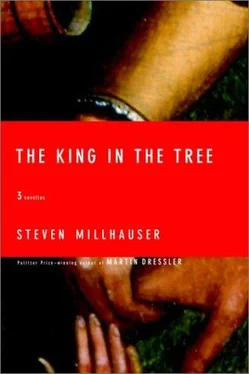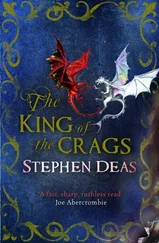One afternoon after his late breakfast Juan accompanied Hood to the stable yard, where one of the grooms replaced a worn bridle and examined a shoe. Juan then rode out with Hood to Avernus, watched his friend disappear into the cave, and rode back to the house. There he sat with Mary and Georgiana in the drawing room before retiring to his apartment, where he threw himself down on the walnut armchair beside his bedroom window. It was an unusually comfortable chair, upholstered in claret-colored wool velvet. He drummed his fingers on the arm, stood up and walked into the sitting room, flung himself across the sofa, rose at once and returned to the bedroom, where he strode to the window. He opened the casement wide and stood with his hands on both sashes as he looked down at a strip of lawn, a plum orchard, a beech grove, and a distant turn of river. A moment later he climbed up onto the window ledge. Directly below was a narrow stretch of lawn, on which lay a rake and a watering can.
Juan leaped, wondering dimly if he would break a leg. On the brilliant jewel-green grass his dark green shadow appeared; as he fell he had the odd sensation that his shadow had been stolen from him and was now being returned. He broke his fall, rolled over twice, and stood up, joined to his shadow. His whole body tingled with exhilaration. And suddenly he recalled his leap into the canal, the lights on the water, the orange peel, the eyes of the merchant’s wife widening in fear, the waiting gondola.
He passed through the orchard and made his way through the coppice of beech trees, past a small lake with an island, and through a pine grove to a melancholy retreat, where paths wound among yew trees, weathered statues, and a dark pool rimmed with crumbling stone. At the far end of the retreat rose an immense oak. Its half-bared roots, thick as saplings, had been artfully shaped to form two seat backs. At the base of each seat was a dark red pillow bearing Hood’s crest: a swan wearing a crown. On one of the pillows lay Juan’s grammar. Juan threw himself onto the other pillow, opened his grammar, closed it immediately, and studied an iridescent insect that was walking on the back of his hand.
Ten minutes later he was studying the same insect as it walked along a blade of grass that Juan slowly tipped from side to side. He looked up to see Mary approaching on a path beside the crumbling pool. The pink silk of her hooped gown rippled with light and shade, the lace ruffles at the ends of her elbow-length sleeves shook on her gloved forearms, and as she drew closer he saw that she was wearing around her shoulders a covering of translucent white fabric, the ends of which were tucked into her low-cut bodice and held in place by a blue silk breastknot.
“ ’Twas impossible to come directly,” she said in a quiet, urgent tone, and the trouble in her face gave her an energy that reminded Juan of her tight, trembling ringlets. “Your note—”
“Georgiana doesn’t”—he groped for the correct word as he rose to his feet—“suspect?” He motioned for her to sit down.
“I told her that I had a terrible headache. I wasn’t to be disturbed — not for any reason. I dislike sneaking. You had something of importance to tell me?”
“There is nothing to be alarmed about. Please sit.” He considered the phrase. “Down.”
“I can stay no more than a moment,” she said, sitting on one of the pillows and resting the backs of her white-gloved hands in her lap, like shells.
“A moment will be more than enough. There is something I must speak to you about”—and as he sat down beside her, looking into her anxious face, examining the shadowy pale skin beneath the translucent gauze handkerchief that revealed her elegant collarbone and swelled over the tops of her breasts before plunging out of sight beneath the big silk bow, he knew that Mary Hood had already succumbed, although she herself did not yet know it, and imagined only that she was having an interesting conversation with a Spanish nobleman under an ancient oak.
“I really must go. Georgiana—”
“Hang Georgiana. I have felt — for some time — that you have been avoiding me.”
“But no — why do you—”
“If I have offended you in any—”
“You — offend me—”
Juan was excited by her wide nervous eyes, by the flush in her neck, by the tense curves of her tight-gloved fingers and the short copper-colored hairs on her cheek near her ear. He could feel a hoop of whalebone bending against his thigh. He had taken her hand, he was leaning toward her — so close that he could see the individual hairs in her lustrous eyebrows, which were darker than her ringlets. Her clear hazel eyes had become cloudy and languorous. The day had grown very still. As he was about to seize her and throw her down on the grass, Don Juan hesitated for a moment, and noticed his hesitation. In that moment he became aware of a faint sound, as of a scratching or scraping. The sound grew louder. There was a thumping or rumbling behind his head — Mary looked over her shoulder in alarm — Juan leaped up with his sword in hand and whirled to stare defiantly at the great oak. A crack appeared in the bark — it was as if the whole tree were breaking before his eyes — and suddenly a door swung open and Augustus Hood stepped out.
“Mary, my dear,” he said, “you look as if you’ve seen a ghost. You look ferocious, Sir! Faith! Do you mean to cut off my head?”
And laughing, trembling with excitement, his cheeks burning with glee, Squire Hood motioned Juan and Mary to look inside the hollow oak, where a stairway led down to an underground passage. It was, he explained as he walked with them back to the house, the most recent extension of a splendid system of subterranean tunnels that he had been working on for some time.
That night as he sat in the walnut armchair in the embrasure of his bedroom window, Don Juan brooded over his moment of hesitation under the oak tree. He had hesitated in part because he hadn’t wished to conquer so easily — he had longed for more resistance, more difficulty, and had been disappointed in the cloudy look of yielding in Mary Hood’s eyes. He had hesitated because Mary was pleasing to him just as she was— an earnest schoolteacher, an ally, a charming companion of his evening rambles, a shy and gentle woman trembling on the verge of destructive ecstasy — and he knew that she would become less pleasing the moment he had enjoyed her favors. He had hesitated because Augustus Hood was one of the few men he had ever liked. He had hesitated because he had hoped to find, in the mysterious North, a new life, unimagined before, a life of desire so deep that it would pierce him like a sword, and the seduction of pretty Mary Hood was a return to the old life. And he had hesitated for some other reason that he couldn’t quite grasp, as if there were something about himself that eluded him, something he was on the verge of knowing but did not know. Then he thought of himself brooding there in his window like a pale philosopher, and he gave a scornful laugh, aloud to the night sky — for nothing was more repellent to Don Juan than a man of uncertainty, a hesitating, careful-stepping man, a man without a woman.
He returned to the routine of Swan Park, but with a feeling of restlessness. For a day Mary seemed awkward in his company and made a point of remaining at Georgiana’s side, but she soon thawed into her old easiness, as if nothing had happened under the old oak tree; perhaps nothing had. Georgiana, who now spoke English in his presence, remained a little aloof, a little mocking. It seemed to Juan that she was rather amused by him, this fantastical don with his plumed hat. As for Squire Hood, his work on Avernus was progressing nicely, though he’d hit a snag in Tartarus: the pasteboard boulder for Sisyphus didn’t have the look of stone, and he was eagerly awaiting a new rock prepared by a stonecutter — a real boulder carefully hollowed and filled with a mixture of wool and straw to prevent a telltale echo. At dinner Hood was in high form, overflowing with anecdotes of his day and arguing with Georgiana about the riddle of the universe. He insisted that the nature of Nature wasn’t at all clear, since although it was true that forests, for example, suggested to the mind ideas of wildness and irregularity, it was equally true that the individual trees in the wildest forest had leaves or cones so regular in appearance that it was difficult not to imagine the hand of an artist; at which Georgiana said Hah! — by his own admission there was design in Nature, whereby one could argue the existence of an ultimate Designer. No no, Hood insisted, that wasn’t at all the case, since the appearance of design was by no means proof of a designer, it being with equal reason arguable that matter had inherent within it a cause of order; and Juan felt that this conversation would never come to an end, that it was arranged expressly never to come to an end, and that the tip of Georgiana’s nose irritated him, and that Mary’s little glances, to make certain he was following the discussion, were even more irritating than the tip of Georgiana’s infuriating nose, and that if he didn’t do something soon — now — this very instant — his head would break loose from his neck and go rolling across the floor — and still he sat there, while the voices spun out delicate threads that bound him, and it seemed to him that he had always sat just that way, like a man caught in a spell.
Читать дальше












